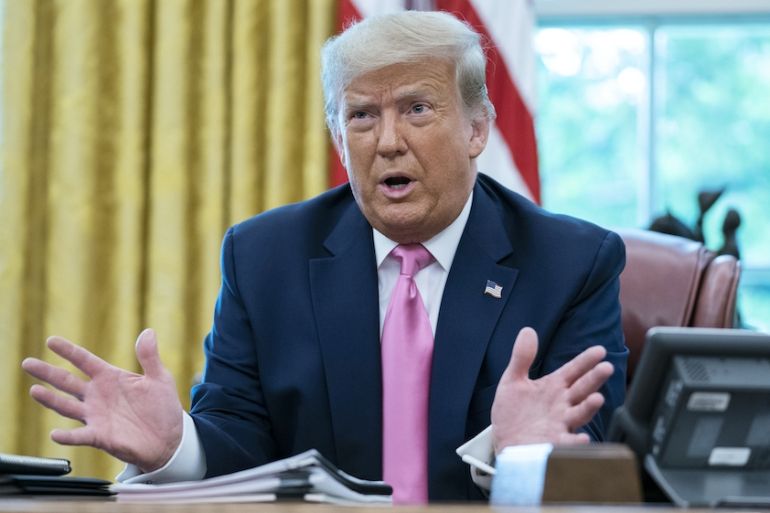Trump payroll tax holiday: What is it? Will it help the economy?
Trump signed an executive order on Saturday temporarily deferring the collection of payroll taxes.

Few things brighten workers’ spirits like a fatter paycheque. On Saturday, President Donald Trump signed an executive order designed to do just that by temporarily suspending the collection of payroll taxes for workers earning less than $100,000 a year.
A payroll tax cut is something Trump has fiercely championed since coronavirus lockdowns swept the nation in March, hurling the US into its deepest recession on record. But Democrats and many Republicans do not support the move.
Keep reading
list of 4 items‘Insurrection’ should bar Donald Trump from US presidency, lawyers argue
Ex-Proud Boys leader Joseph Biggs sentenced to 17 years for US Capitol riot
Trump indictments: Key court dates set in Georgia, federal election cases
So what is the payroll tax? And how does deferring it affect workers – including those who are currently unemployed – not to mention, the economy?
What is the payroll tax?
Payroll taxes fund government programmes, primarily Social Security (US federal old age, disability and survivor benefits) and Medicare (a federal health insurance programme for older folks).
Who pays payroll taxes?
They are paid by workers and their employers. Most US workers see 7.65 percent of their wages deducted directly from their take-home pay and flown into the waiting hands of the Internal Revenue Service (the US federal tax-collecting agency). Employers remit the same amount to the IRS.
Do all workers take the same hit?
The maximum amount of earnings subject to the Social Security tax is capped at $137,700 a year. People who make more than $200,000 a year and couples who make more than $250,000 a year pay a higher percentage of Medicare taxes. And the self-employed have to pay both the employee and employer share of payroll taxes- a whopping 15.3 percent.
So will Trump’s payroll tax holiday mean more take-home pay for workers?
Provided they are working, making less than $100,000 a year and employers stop withholding those taxes- then yes – they will probably see their payroll taxes deferred from September 1 through the end of the year.
Wait – deferred? Does that mean they’ll have to pay these taxes eventually?
Trump’s executive order directs the Secretary of the Treasury to “explore avenues” to eliminate the obligation to eventually pay deferred payroll taxes.
Any chance this could become permanent?
Trump said on Saturday that if he is re-elected in November, he will make these tax cuts permanent.
Can he do that?
Good question. It’s unclear whether Trump has the authority to call a payroll tax holiday or make it permanent without approval from Congress.
Let’s say it goes head. What does it mean for the economy?
Fatter paycheques usually encourage consumers to spend more. And consumer spending is the engine of the US economy, driving some two-thirds of growth.
That said, the coronavirus pandemic has altered consumer spending patterns, so to what degree a payroll tax deferral would impact economic growth is not clear.
What about cutting payroll taxes for employers?
They already got some relief on that front. The virus aid package Congress passed in March allowed eligible employers to defer paying their portion of payroll taxes through the end of the year.
Why are some people against a payroll tax holiday?
Well for starters, a payroll tax holiday does not directly fix what many regard as the most pressing pandemic-related problems facing the US economy – namely getting the tens of millions of Americans who are currently collecting unemployment benefits back to work.
So what happens to the unemployed?
Trump also signed an executive order on Saturday extending the top-up to unemployment benefits. Only rather than the previous rate of $600 a week – which expired last month – he cut it to $400 a week.
Does Trump have the power to do that?
Again, not clear. Because the US Constitution gives Congress authority over federal spending.
Any other concerns over a payroll tax holiday?
Critics also worry about how a payroll tax holiday could impact Social Security and Medicare. Both programmes were already looking at funding shortfalls before the pandemic struck and coronavirus has made the situation even worse.
In June, the non-partisan Committee for a Responsible Federal Budget forecast that the Social Security trust funds would exhaust their reserves by 2031.